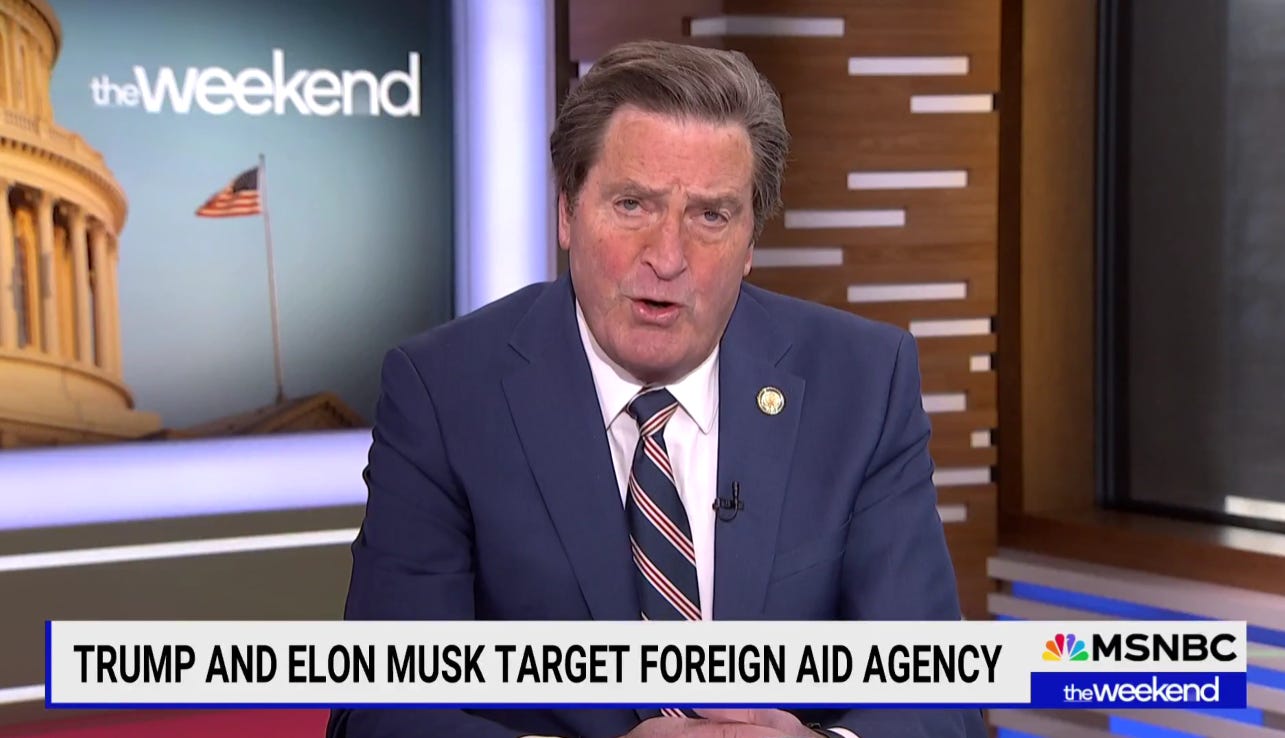‘Where is the humanity?’: Congressman urges protection of USAID amid Trump’s agency cuts
Democratic Congressman John Garamendi (Ethiopia 1966-68) served in the Peace Corps and has seen the impact of USAID firsthand in Ethiopia. He joins The Weekend with a passionate defense of the agency’s mission.

Click here to watch Congressman Garamendi’s MSNBC interview.
Citing his and Patti’s own experience with USAID in 1967 as Peace Corps Volunteers in Ethiopia, Congressman Garamendi noted that food and medical supplies provided by USAID are saving lives and and providing security here in the U.S. Gutting USAID threatens billions of dollars of income for American farmers, considering that, right now, the purchase of $340 million in rice, wheat, and other commodities has been paused.
Garamendi emphasized that USAID’s humanitarian assistance is an essential American program. “It is America’s soft power” he said, quoting retired General Jim Mattis’ 2017 reference to the need for more more ammunition if soft power is done away with. “Pulling away from our humanitarian assistance in places like Africa will allow China to fill the void and gain influence in the region. This is a national security issue as well as a humanitarian issue.”
Assuring that Congress will push back in every way possible, Garamendi underscored that the Trump administration has no legal authority to suspend USAID humanitarian assistance. It is illegal for the executive branch to kill or stop USAID and to fold it into the State Department. He and other members of Congress will support the lawsuits and continue to promote the good work of USAID abroad and the benefits here at home.
“This is a personal issue. This is something Patti and I have been spent our lives working on. I would just ask Trump to go to a famine refugee camp. Hold a starving child in your hand. Look at the extended body and vacant eyes. That child is going to die.” Where is the humanity? Do they understand what they are doing?”
Click here to watch Congressman Garamendi’s MSNBC interview.
And share this video with your networks:
Exactly, Congressman. I couldn’t agree more.
THE WIND
I hear in the wind long-gone voices that knew the language of flowers, tasted the bitter root, hoped, placed stone upon stone, built an order, blessed the wild beauty of this place.
I hear old sorrows in new voices, undefeated desires, and the muffled advent of something I define as bright, new angels.
I hear old phantoms in a swirl of the released mustardstar
and the cry of innocence.
© Copyright Edward Mycue Ghana 1 1961
TODAY WHEN PEACE MANY NOT BE POSSIBLE: DREAMS ODE
Dreaming’s alike poetry having many of unknowns yet not unlike a “wake up little Susie” ballad and at the time of world war two and today even at the price of a ticket here what we’re seeing here even now today where peace may not be possible nor even below a pulse feeling around for peace while some fiddling finds solace for bare dedication to beauty under a barrel everything bending a cent
ury and a skull factory naked to knowledge fiddled yet not seen nor understood, not seen as our launched bitter better-dressed than merely some camouflaged sun-dazed memory whose flight journeys welcome desires to final oblivion following some and fleeing others’ stained-glass quest-end scarlet conclusions.
© Copyright Edward Mycue revised Feb 23, 2025 Sunday 1:07 noon for Jules Mann across the Atlantic these days
This seems like a good spot to post the following excerpt.
Deep in a very long article in The Atlantic Monthly is the following assertion about the value to the nation of Peace Corps service.
Tales from the Bazaar
“Another characteristic of the new Arabists is that many of them have Peace Corps backgrounds. Walter, for instance, served in the Peace Corps in the Muslim word before joining the Foreign Service. More than a third of those Foreign Service officers chosen for last year’s Senior Seminar–a prestigious program for potential ambassadors–were Peace Corps veterans. The Peace Corps experience, redolent as it is of foreign aid to the Third World, may seem hopelessly out of date in the current post-Cold War climate. But in terms of what the Foreign Service needs to improve its analytical skills and to adapt to this new reality, the Peace Corps has never been more relevant.
Peace Corps graduates, adept at living and working in the bush on meager resources, are oriented toward a leaner Foreign Service that gets out onto the streets–embassy paperwork be damned–to find out what is going on. The growth of the Peace Corps contingent among Arabists, and in the Foreign Service at large, runs parallel to the middle-class takeover of the formerly elitist State Department–a process that has now reached the point of saturation. A Peace Corps background in today’s State Department carries the allure that an Ivy League education once had.”
Copyright © 1992 by Robert Kaplan. All rights reserved.
The Atlantic Monthly; August 1992; Tales from the Bazaar; Volume 270, No. 2; pages 37-61.
https://www.theatlantic.com/past/docs/unbound/flashbks/saudiara/kaplan.htm?form=MG0AV3
The article provides a lot of background, through interviews with a long line of diplomats, on the current muddle in the Middle East.